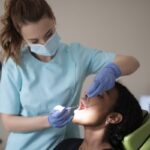It is always best that you speak with your doctor about the best test for you.
The best thing for people suffering from symptoms is to have one of the two diagnostic viral tests done.
If you are experiencing symptoms, it is worth getting the rapid antigen test for travel. If the test is positive, you should immediately take precautions to prevent the virus spreading to others.
If the antigen test comes back negative, it is a good idea to get another molecular (akaPCR) test. Make sure you isolate yourself from the test until you receive your results.
The molecular/PCR test is a better option for most people who don’t have symptoms, but wish to be tested in case they have been exposed. This test can detect small amounts of virus before symptoms appear.
There are three types of coronavirus test available, with important differences.
The virus tests are diagnostic and look for the virus’ components. If a person is found to have SARS-CoV-2, it means they have COVID-19. This can be done in two different ways.
PCR/Molecular Tests
A molecular test can be performed by using a technique called Polymerase Chain Reaction (PCR). This method creates millions to billions copies of viral-related DNA quickly. It will be detected if there is even a small amount of this genetic material. PCR/molecular tests are extremely sensitive and specific. SARS-CoV-2 can be confirmed by a positive test almost every time. Samples taken via saliva, nasal or throat swabs and saliva can all be tested.
It is however a slow process because molecular/PCR testing are almost always done in specialized labs. Outpatient tests are not usually available within a day, and can take longer.
Antigen Tests
Another viral test is the antigen test. This is simpler and can be performed in most doctor’s offices with a nasal or throat sample. It may be possible to do it at home, or in other settings.
An antigen test is fast – providing results in minutes. However, it is less sensitive than the molecular/PCR tests. The test can only be positive if there is more virus. An antigen test can sometimes turn out to be falsely negative. This means that a negative result is not always reliable. Although a positive test is usually a positive sign that the virus exists, false positives are more common than with PCR/molecular tests.
Antibody tests
An antibody test is used to determine the body’s reaction to SARS-CoV-2 (the virus that causes COVID-19). This blood test is useful in determining whether you have the disease. Antibody tests should not be used for diagnosing the virus.
Although there are some indications that antibodies might provide protection against infection, this has yet to be proven. Therefore, results from an antibody test should not serve as a basis for determining immunity.




